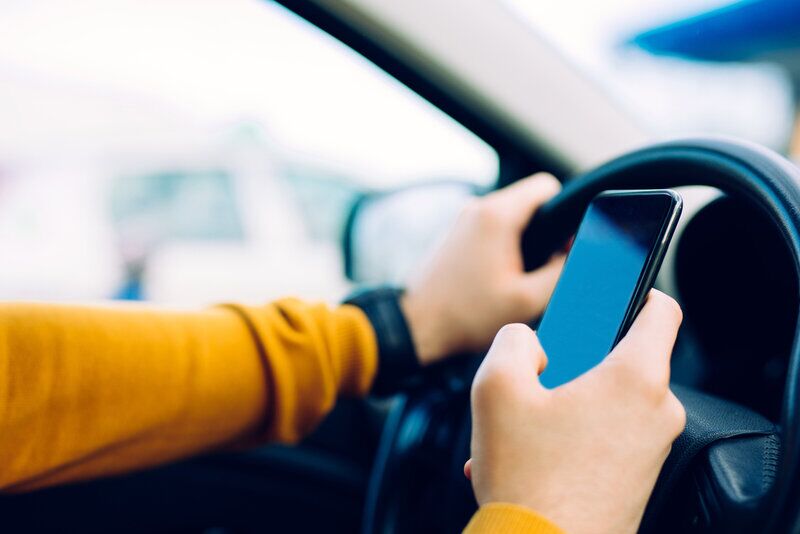
Whether it’s legal to use a phone while driving in Texas depends on the type of driver’s license you have and how the phone will be used.
Texas allows most drivers to talk on a cell phone while operating a vehicle, although it is dangerous to do so because it creates a distraction. Some types of drivers such as those with a learner’s permit and school bus drivers transporting children are prohibited from talking on a cell phone.
Texas law prohibits drivers of all ages from using a phone to send text messages while driving. Texting is an extremely dangerous form of distracted driving.
Cell Phone Laws While Driving in Texas
It’s helpful to review the laws in Texas pertaining to the use of a mobile phone or wireless communication device while driving.
Drivers who are just learning to drive and have learners’ permits are prohibited from using a cell phone while driving. Young drivers need to focus their undivided attention on the task of driving.
Drivers under the age of 18 are prohibited from using a handheld cell phone.
School bus drivers are not allowed to use a cell phone while driving if children are present.
It’s illegal for all drivers to use any type of handheld cell phone while driving on public school property or in a school zone during times when reduced speed limits are in effect.
Texas law makes an exception to the restrictions on using a cell phone. You may use your cell phone to contact law enforcement or in case of an emergency. If you must make a call, try to pull off the road first.
So, is it illegal to text and drive?
Yes. Since 2017, it’s been against the law in Texas to send or receive a text message while driving in Texas.
What is Distracted Driving?
Distracted driving involves any activity that takes your eyes of the road, your hands off the wheel, or your mental focus off the task of driving.
Talking on a phone is one type of distraction. Talking to passengers, fiddling with the radio, eating a snack, putting on makeup, or looking at a map are all forms of driver distraction. Any form of distraction can lead to a preventable traffic accident.
Whenever you are driving and don’t have your full attention on the road, you are putting yourself and your passengers at risk so stay focused.
A mobile phone poses a significant distraction and drivers should avoid using it while driving.
Dangers of Distracted Driving
Distracted driving can lead to a traffic ticket or a serious crash.
Distracted drivers were responsible for nearly one of every five crashes in Texas in 2020, according to the Texas Department of Transportation. Distracted driving accidents caused the deaths of 364 people and cause 2,200 people to sustain serious injuries in Texas.
Nationwide, about 3,000 people are killed in crashes involving a distracted driver each year, according to the Centers for Disease Control.
Young drivers ages 15 to 19 are more likely to be distracted than drivers ages 20 or older. But anyone can be involved in a distracted driving accident.
You should give the task of driving your full attention. Do not attempt to multitask while driving.
Cell phones affect how drivers process information. When drivers are cognitively distracted by a cell phone, researchers have found that the drivers’ visual processing and attention are suppressed.
When traveling at highway speeds in Texas, drivers have only seconds to recognize and react to traffic hazards ahead to avoid a collision. Distracted drivers may be slower to recognize changes in traffic such as drivers braking unexpectedly ahead. That can lead to a traffic accident. That is why it is critically important to be alert and focused on driving when behind the wheel.
You should pull off the road and stop before you talk on the phone or send a text message.
Can You Text at a Red Light in Texas?
Yes, It’s illegal to write, send or read a text message while driving in Texas.
Sending text messages on a phone while sitting at a red light is against the law in Texas. When stopped at a light, a driver is still operating a vehicle, according to Texas law.
Violating the no texting while driving law carries a $200 fine.
Texting is an especially dangerous form of distraction because it involves multiple forms of distraction. A driver takes his or her eyes off the road to look at the phone screen and their mind off the task of driving. The distracted driver uses his or her hands to type a text message. The amount of time it takes to type a text message while driving 55 miles per hour is equivalent to driving the length of a football field blindfolded. That is a truly alarming thought.
If your cell phone buzzes or rings, you should not answer it or respond to a text message. It’s a good idea to put your cell phone in the trunk or back seat out of reach, so you won’t be tempted to look at it while driving.
Distracted Driving Accident Attorneys in Dallas
Our Dallas car accident attorneys at our law firm, stand up for people who have been injured by distracted drivers. A serious car accident can disrupt your life and leave you facing expensive medical bills and financial stress. If the crash was caused by another driver’s negligence, you shouldn’t be stuck with the bills.
As you struggle to recover from serious injuries, you may feel overwhelmed. Our attorneys can deal with the insurance companies on your behalf. We help the victims of car accidents caused by distracted drivers pursue full and fair compensation for their losses. We have more than 45 years of experience representing Dallas car accident victims and their families. Turn to the compassionate and experienced attorneys at Kraft & Associates, Attorneys at Law, P.C., to assist you in seeking compensation for your distracted driver accident-related losses.